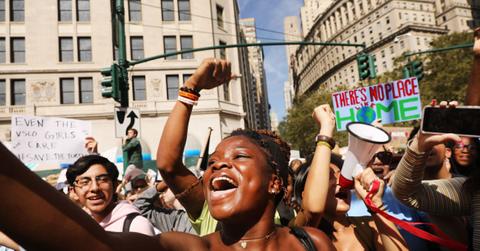Support These Intersectional Environmental Organizations for Black History Month
Updated Feb. 1 2021, 12:58 p.m. ET

Thousands of New York City students walk out of school to take part in a march to demand action on the global climate crisis on September 20, 2019 in New York City.
Black History Month officially begins on Feb. 1, celebrating Black excellence while recognizing the continuous struggle Black people have endured in the U.S. for hundreds of years. There are many ways to educate yourself and support the Black community in honor of the month-long holiday, and if you want to specifically show your support for intersectional environmentalism, donate to these Black environmental organizations.
Outdoor Afro
Black people are often underrepresented in the environmental community — especially in the realm of outdoor exploration. Outdoor Afro is a fantastic national nonprofit that highlights Black leaders in the world of nature, while connecting Black people to outdoor experiences nationwide, organizing group hikes, bike rides, and other awesome outdoor group activities. Donating to the organization provides funds to make these group activities possible.
OPAL Environmental Society
Organizing People Activating Leaders (OPAL) Environmental Society is a Portland, Ore.-based grassroots organization that focuses on getting Black, Indigenous and People of Color (BIPOC) youth involved with organizing for change. It started with speaking out against outdoor and indoor quality concerns for people in marginalized communities, but later moved beyond that, focusing on transportation, housing, land use, and public health concerns, as well as climate policy as a whole.
Afro Vegan Society
Unfortunately, the vegan movement has been largely whitewashed, and many BIPOC communities have been overlooked in terms of education and support regarding switching to a plant-based diet. Afro Vegan Society, however, is a national nonprofit that provides resources, information, and support to people in these communities, to help those interested transition to a vegan lifestyle for the sake of their health and the environment.
Hip Hop Caucus
Hip Hop Caucus educates voters and advocates for climate action from the BIPOC perspective. Unfortunately, BIPOC communities are disproportionately affected by climate issues, namely because the government and corporations tend to erect factories and other harmful facilities that produce air and water pollution in those areas. Hip Hop Caucus' Think100 campaign, however, educates people on these matters and advocates for environmental and racial justice.
Project Eats
Low-income BIPOC neighborhoods are more likely to be areas known as "food deserts" (the Food Empowerment Project prefers the terms food apartheid or food oppression), which are areas where fresh, nutritious food is unaffordable or nearly impossible to find.
To combat this, New York City-based organization Project Eats grows fresh food for neighborhoods that need it. You can donate to the group or even join the team, if you have a green thumb!
The Sunrise Movement
The Sunrise Movement is a national nonprofit organization that encourages young people to get involved with advocating against climate change. A diverse leadership helps the group focus on intersectionality, as they push for important movements such as the Green New Deal and other more direct environmental policies.
Generation Green
Generation Green is an organization that focuses on amplifying the voices of young Black climate activists. The group provides a variety of nationwide programs to encourage Gen Z organizers to get involved with the fight against global warming, to engage their communities, and to potentially find a career in the world of environmental justice.
Black Dirt Farm Collective
Black Dirt Farm Collective is a group composed of Black farmers, educators, scientists, agrarians, seed keepers, organizers, and researchers. Together, they advocate for intersectional and sustainable agricultural practices, agricultural education, food justice, and land justice.
Intersectional Environmentalist
Intersectional Environmentalist is completely dedicated to teaching the masses about the intersection of environmental justice and racial justice. It simultaneously advocates for protecting both the people and the planet, and identifying the ways in which environmental justices affect BIPOC communities. Donations are allocated towards building a digital community based on education, and paying BIPOC writers for personal essays and other articles of the like.
GrowNYC
GrowNYC aims to improve the quality of life for New Yorkers, by implementing environmental programs in neighborhoods citywide. When it started in 1970, the organization was mostly policy- and education-based, but slowly, it started being able to establish real-life changes, from implementing Stop 'N' Swap recycling collection stations, Greenmarket fresh food boxes, and educational programs in schools.
While GrowNYC is not explicitly Black-led, the organization is constantly making efforts to diversify its team, and it also runs multiple initiatives specifically targeted at uplifting and honoring Black farmers, agriculturalists, advocates, and more.
Climate Justice Alliance
Climate Justice Alliance (CJA) was created in 2013 to help communities at the frontline of climate injustices (which — as previously mentioned — are often BIPOC communities) to help address issues they're facing. The CJA helps these communities confront the government on these issues, and expose false "promises" made to them that will ultimately cause further environmental disruption. Donating money helps give resources to these communities in need.
Communities for a Better Environment
Communities for a Better Environment (CBE) advocates for heavily polluted BIPOC communities in California. The organization provides residents with organizing skills, leadership training, and legal assistance so they can more easily confront issues affecting their communities.
There are so many ways to show your support for intersectional environmentalism, and now is a better time than ever to start doing so.